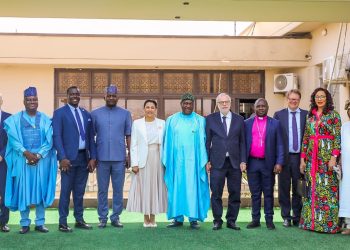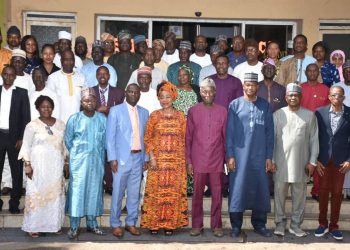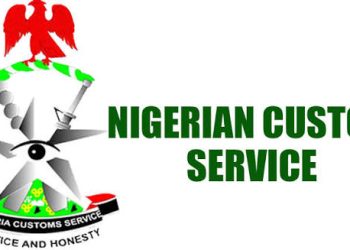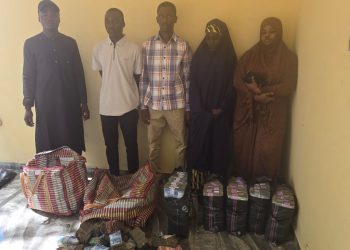By: Mnena Iyorkegh, Abuja
The United Nations Educational, Scientific and Cultural Organization (UNESCO), Abuja, has reaffirmed its commitment to supporting inclusive peacebuilding and empowering communities with tools for dialogue, tolerance, and social cohesion to combat religious discrimination across Nigeria.
This was stated in Abuja, Nigeria’s capital, during an Inter-Religious Workshop on promoting Religious Tolerance and Peace in Nigeria, a training on the use of the IDFP Interfaith Code of Conduct (ICoC).
The workshop, organized by the UNESCO Abuja Office in partnership with the Interfaith Dialogue Forum for Peace (IDFP), aimed to foster constructive dialogue on religious tolerance, using the Interfaith Code of Conduct (ICoC) as a central tool.
Declaring the workshop open, the Head of Office and Representative of UNESCO Abuja, Mr. Albert Mendy, represented by the Head of Sector, Communication and Information, Ms. Nuhu Yachat, explained that the gathering reflects UNESCO’s commitment to advancing peace, mutual respect, and understanding through dialogue and cooperation.
“This event reflects our continued commitment to fostering dialogue, education, and cooperation to counter discrimination in all its forms. The Interfaith Code of Conduct, jointly developed by the Christian Association of Nigeria (CAN) and the Nigerian Supreme Council for Islamic Affairs (NSCIA), is a bold and timely framework to promote interfaith harmony and prevent the misuse of religion as a tool for division. It is part of our ongoing work under the Global Call against Racism and Discrimination and aligns with our strategic objective to strengthen anti-discrimination efforts in Nigeria by empowering communities and institutions with knowledge, tools, and platforms for inclusive engagement.”
According to Mr. Mendy, the workshop serves as an avenue for knowledge sharing and building bridges to strengthen interfaith relationships.
“This workshop offers more than conversation. It offers capacity—the opportunity to gain practical tools and insights to support peacebuilding efforts, to confront intolerance where it emerges, and to become champions of dialogue within your faith communities and beyond. The need for interfaith understanding has never been more urgent. In a world where misinformation, prejudice, and extremist narratives can spread rapidly, initiatives like this serve as anchors—reminding us of our shared values and collective responsibility,” Mendy said.
He further urged religious leaders to prioritize peace messages and actively promote them within their communities.
“We aim to raise awareness of the ICoC and encourage its adoption within and beyond religious institutions; facilitate open and honest dialogue on the origins of religious stereotyping and its consequences in communities; and strengthen interfaith collaboration among leaders, policy actors, and the media in our collective effort to promote peaceful coexistence, in line with Sustainable Development Goal 16: Peace, Justice, and Strong Institutions”, he urged
Also speaking, the President of the Christian Association of Nigeria (CAN), His Eminence Archbishop Daniel Okoh, emphasized that the workshop is a training ground for peacebuilders, a forum for mutual listening, and a platform for practical collaboration.
“At a time when our nation faces increasing polarization along religious and ethnic lines, gatherings such as this represent a beacon of hope. They remind us that while religion can be misused as a tool for division, it can also be a powerful force for unity, healing, justice, and reconciliation. The IDFP Interfaith Code of Conduct, which is the focus of our training today, stands as a moral and spiritual compass. It is not just a document, but a covenant—a shared declaration of principles that call us to the highest standards of interfaith engagement.”
According to him, it is every leader’s responsibility to uphold the message of peace, because peace is the fruit of mutual respect.
“As leaders of faith, we bear a sacred responsibility. Our words shape the consciences of millions. Our actions or inactions can either stoke the flames of discord or quench them with the waters of compassion. The Christian Association of Nigeria has always stood for peace, justice, and dialogue. We believe that the message of love for our neighbors demands that we uphold the dignity of all people, regardless of their faith or tribe. Let me emphasize that peace is not merely the absence of conflict. Peace is the presence of justice. Peace is the fruit of mutual respect. Peace is nurtured through education, dialogue, and the deliberate dismantling of prejudices”, he added
On his part, the Administrative Secretary of the Nigerian Supreme Council for Islamic Affairs, Abubakar Akande, stressed the need for people of different faith backgrounds in Nigeria to have platforms for dialogue and meaningful conversations towards building a better nation.
“Through meaningful and constructive dialogue, we’ll be able to break barriers, dispel stereotypes, clarify assumptions, and ultimately build bridges of mutual understanding and respect, which will help us to honor and dignify our shared humanity. On that note, I want to reassure everyone of the Nigerian Supreme Council for Islamic Affairs’ commitment to peacebuilding efforts for a united and prosperous Nigeria”,
Speaking on behalf of the Interfaith Dialogue Forum for Peace (IDFP), the Director of Al-Habibiyyah, Imam Fuad Adeyemi, commended UNESCO for the opportunity given to map out strategies for achieving peaceful coexistence through the ICoC, which serves as a living guide for building bridges across religious divides and deepening mutual respect across Nigeria’s diverse faith traditions.
“I want to thank UNESCO for organizing this workshop to help us understand our mission here and the importance of our work. I also thank them for their support in taking this initiative to the grassroots. This will serve as training access for us to share what we’ve learned back home. In situations where two groups work together, there must be decorum, rules and guidelines to be mindful of. Being conscious of such standards helps guide our actions, and that is the essence of our work here,” he noted.
The one-day workshop, held under the umbrella of UNESCO’s Global Call against Racism and Discrimination, brought together key religious leaders, civil society actors, media professionals, and government representatives.
The event explored the roots of religious stereotypes, shared best practices in conflict prevention, and reaffirmed commitments to promoting the adoption of the ICoC within respective communities.















